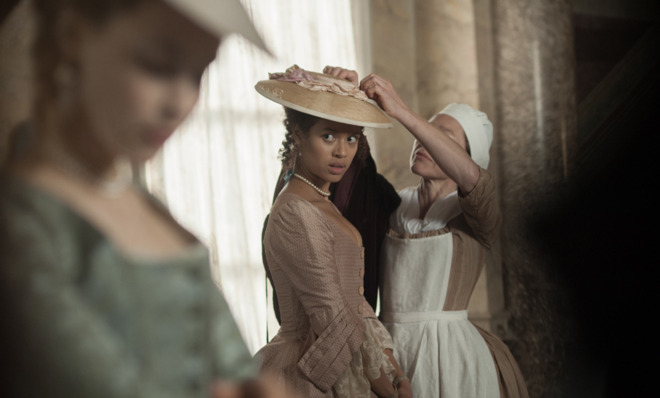Girls on Film: Hollywood's 4 percent problem
This year, a criminally low 4 percent of movies are going to be directed by women. It's time for the industry to fix this.


A free daily email with the biggest news stories of the day – and the best features from TheWeek.com
You are now subscribed
Your newsletter sign-up was successful
You might think women have kicked ass in the film business in recent years. In 2009, Kathryn Bigelow became the first woman to win the Best Director Oscar. On the eve of her 50th birthday, Sandra Bullock found the greatest financial and critical success of her career while shouldering the blockbuster Gravity. Kristen Wiig and Melissa McCarthy have reinvigorated the world of female comediennes (and made Hollywood see them as a potential goldmine).
Unfortunately, those anomalies mask the actual numbers, which are as disheartening as ever.
Last year, USC's Annenberg School for Communication and Journalism dropped a bomb: In many ways, opportunities for women in the film industry are actually getting worse. By examining the top 100 films from the past few years, the study found that the number of female characters has decreased over the last five years, and films with equal male and female casts have been cut in half, to a paltry six percent. Of 2012's top 100 movies, only four were directed by women.
The Week
Escape your echo chamber. Get the facts behind the news, plus analysis from multiple perspectives.

Sign up for The Week's Free Newsletters
From our morning news briefing to a weekly Good News Newsletter, get the best of The Week delivered directly to your inbox.
From our morning news briefing to a weekly Good News Newsletter, get the best of The Week delivered directly to your inbox.
The same trend holds true today, though while 2012's disappointing four percent was for only the top 100, leaving other femme-centric films in the margins, 2014's four percent is for all films currently scheduled — both limited and wide release.
Two years ago, when Girls on Film looked forward to 2012, there weren't many wide releases, but there were a number of notable films hitting screens. January alone boasted a slew of British talent — Lynne Ramsay's We Need to Talk About Kevin, Phyllida Lloyd's The Iron Lady, and Julie Anne Robinson's One for the Money. The rest of the year boasted work by Agnieszka Holland, Madonna, Athina Rachel Tsangari, Lynne Shelton, Lorene Scafaria, Anne Fletcher, Mary Harron, Andrea Arnold, and more.
2013 didn't look as promising. Only five films from female filmmakers were slated for release as the year rang in: Kathryn Bigelow's Zero Dark Thirty, Kimberly Pierce's Carrie, Tina Gordon Chism's We the Peeples, Maggie Carey's The To Do List, and Jennifer Lee's Frozen (co-directed by Chris Buck). There were two anthologies that added three filmmakers to the count — Movie 43 and The ABCs of Death. That's seven films total, out of the 130-plus that were slated for release at the start of last year.
It's even worse this year. Out of 149 films slated for release over 2014, there are only six from female filmmakers. Five of them should see wide release, and one is a co-directed effort. The first, Shana Feste's remake of Endless Love, hits on Valentine's Day. The indie Belle, by Amma Asante, follows in May. In July, two will arrive on the same weekend with Trish Sie's Step Up: All In arriving alongside Lana and Andy Wachowski's Jupiter Ascending. Niki Caro's sports drama McFarland follows in November, and Angelina Jolie is primed to close the year with her World War II drama Unbroken.
A free daily email with the biggest news stories of the day – and the best features from TheWeek.com
Unsurprisingly, Annenberg's study also found that films made by women featured more female characters. That finding correlates with this year's roster. There are multiple movies scheduled for 2014 about old men trying to stave off death, continuing the theme presented by last year's The Wolverine. There are forays into the Bible, plus men being fathers, traveling through history, racing cars, competing in spelling bees, fighting wars, cooking food, singing tunes, bonding with dolphins, bonding with other men, and hosting talk shows. Men are going on business trips, renting apartments for cheating, and generally being tough. Where are the women?

Well, female characters are stuck with the usual tropes. Divergent's Tris and Scarlett Johansson's Lucy are joining Katniss as female asskickers. Other women are having a wild time in Vegas and planning revenge on a cheating beau, stripping to lure men to their demise, and enjoying all manner of romance. The few that stick out from the norm include the Quvenzhane Wallis-starring remake of Annie, Angelina Jolie's long-awaited Maleficent, the Snow White-esque Jupiter Ascending, Veronica Mars' trip to the big screen, and Melissa McCarthy's project with husband Ben Falcone, Tammy, which will get Thelma & Louise's Susan Sarandon on another femme-centric road trip.
The usual refrain is that success leads to change, but the numbers have continued to drop, despite so much notable success. Bigelow won, and yet, few women are still a part of each year's awards ceremonies. Even Bigelow herself was shunned last year with Zero Dark Thirty, one of the best-reviewed films of the year (and five times more successful than her winning feature, The Hurt Locker). Audiences flock to a show with strong female characters, and the studio complains about having a female audience. Each year has great, femme-centric blockbusters, and yet the number of these types of films fails to rise.
The only area where success has led to a positive and palpable increase is the world of comedy. In 2010, comediennes were rare, and now they're dominating the comedy landscape. Some of that is due to financial success, of course. It helped when Bridesmaids raked in almost $300 million. It helped even more when it became producer Judd Apatow's most successful film to date, over hits like The 40-Year-Old Virgin and Knocked Up.
But the bigger boost was mentorship. After building his empire on man-boys, Apatow began to focus more on female talent. After seeing Tiny Furniture, he helped Lena Dunham craft Girls, which has been a reliable media whirlwind ever since. He broke Kristen Wiig out of the supporting role carousel with her co-written Bridesmaids, which also turned Melissa McCarthy from the beloved but marginal Sookie St. James of Gilmore Girls into one of the first ladies of comedy. The same can be said for Lorne Michael's mentorship of Tina Fey, which started with Saturday Night Live, and continued into 30 Rock, Mean Girls, and Baby Mama. (Fey has, in turn, boosted the wonder-duo of herself and fellow SNL alum and Weekend Updater, Amy Poehler.)
This isn't enough.
"The movie industry is failing women, and until the industry starts making serious changes, nothing is going to change," film critic Manohla Dargis said last year. This is absolutely right.
Just imagine if the rest of Hollywood followed Apatow's lead — and the kind of films and characters we'd get if Martin Scorsese, Steven Spielberg, and the rest of Hollywood's powerhouses actively fostered female talent.
Until that happens, we might as well get used to the four percent — or if the numbers keep declining, even less.
Girls on Film is a weekly column focusing on women and cinema. It can be found at TheWeek.com every Friday morning. And be sure to follow the Girls on Film Twitter feed for additional femme-con.
Monika Bartyzel is a freelance writer and creator of Girls on Film, a weekly look at femme-centric film news and concerns, now appearing at TheWeek.com. Her work has been published on sites including The Atlantic, Movies.com, Moviefone, Collider, and the now-defunct Cinematical, where she was a lead writer and assignment editor.
-
 Political cartoons for February 21
Political cartoons for February 21Cartoons Saturday’s political cartoons include consequences, secrets, and more
-
 Crisis in Cuba: a ‘golden opportunity’ for Washington?
Crisis in Cuba: a ‘golden opportunity’ for Washington?Talking Point The Trump administration is applying the pressure, and with Latin America swinging to the right, Havana is becoming more ‘politically isolated’
-
 5 thoroughly redacted cartoons about Pam Bondi protecting predators
5 thoroughly redacted cartoons about Pam Bondi protecting predatorsCartoons Artists take on the real victim, types of protection, and more
